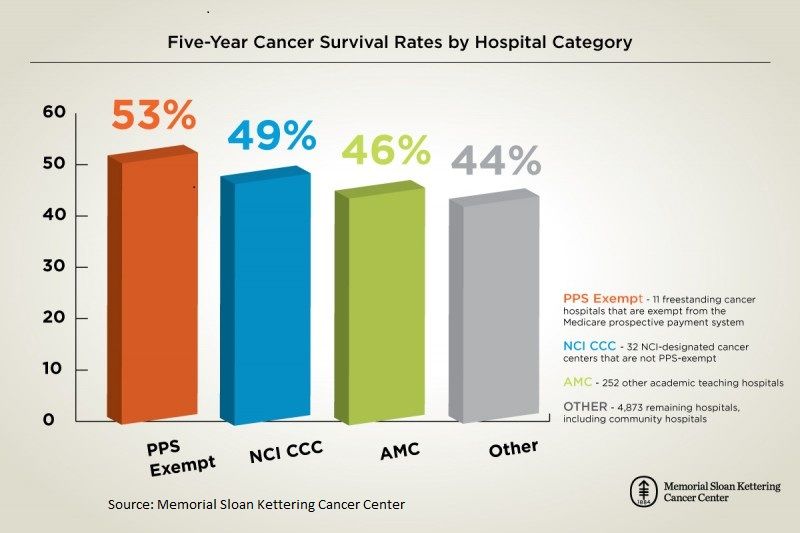- Center on Health Equity & Access
- Clinical
- Health Care Cost
- Health Care Delivery
- Insurance
- Policy
- Technology
- Value-Based Care
Can Cancer Survival Outcomes Help You Choose Your Site of Care?
A new study published in JAMA Oncology has identified disparate survival outcomes across sites of care.
A study by researchers at Memorial Sloan Kettering (MSK) Cancer Center, while substantiating the usefulness of Medicare administrative data in outcomes studies, provides evidence of disparate care across hospital types. Published in JAMA Oncology, the study concluded that patients treated for cancer at hospitals exempt of the Medicare prospective payment system (PPS) had significantly better 5-year survival rates than other hospitals such as NCI-designated cancer centers, other academic teaching hospitals, and community hospitals.
The authors used national Medicare claims data from 2005 to 2009, along with Surveillance, Epidemiology, and End Results (SEER)-Medicare data from 2006 for the subset of the United States covered by the SEER program. Risk-adjusted cumulative mortality rates of patients with cancer was captured in both data sets at the hospital level. The final analysis included nearly 750,000 Medicare beneficiaries with lung, prostate, breast, colon, and other cancers. In addition to survival outcomes, the analysis tested the hypothesis that information on cancer stage may not be necessary for risk adjustment studies.
Significantly big differences in survival exist between different hospitals, the study observed; while PPS-exempt hospitals had a 53% 5-year survival rate among patients, NCI designated cancer centers hovered around 49%, other academic teaching hospitals at 46%, while community cancer centers were the lowest at 44%.

“Patients need reliable information about hospitals’ survival rates so they can make informed choices about their care,” said David Pfister, MD, chief of MSK’s Head and Neck Oncology Service and lead author of the study. “But similarly important, measuring the differences in survival rates among hospitals is a first step toward improving cancer care at every hospital across the country.”
Referring to the survival care gap, Peter Bach, MD, director of MSK’s Center for Health Policy and Outcomes indicated that these results have a big public health implication. A confirmation of their study results would make it essential to break down the data and identify the source of the care gaps, he added.
